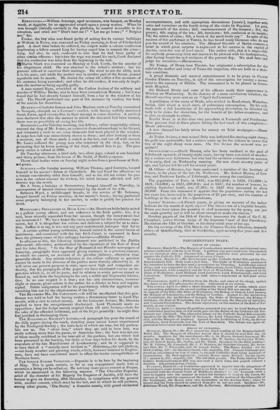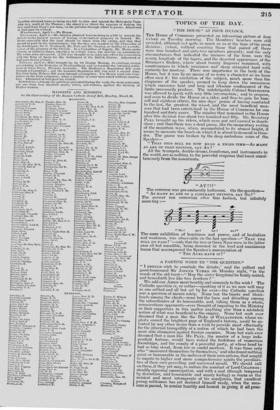PARLIAMENTARY DIARY.
HOUSE OF LORDS.
MONDAY', March 30.—The Marquis of Londonderry moved for, and obtained some returns connected with the Coal Trade. A petition was presented from Macclesfield for an increased duty on Thrown Silk. Many petitions were presented for and against the Catholic Bill. Adjourned at seven o'clock. Tu ES DAY, March 31.—Mr. Peel brought up the Catholic Relief Bill and the Dis- franchisement Bill. Both read a first time. The Duke of Wellington announced his intention to have the first read a second time on Thursday. Lordllexley wished delay; and was supported by the Earl of Mahn esbury, Lord -Eldon, Lord Farnham, Lord Sidmonth, Lord Longford, and the Earl of Winehilsea. Delay opposed by the Duke of Wellington, Lord Holland, Lord Goderich, Lord Ellenborough, and Lord Carnarvon. Petitions presented on both sides.—Adjourned at half-past seven o'clock. 'lunsasnAv, April 1.—Petition from Dr. Doyle, and some of his clergy, against the clause in the Bill affecting the Jesuits. Adjourned at six o'clock.
THU!: SDAV, April 2.—After a short discussion on a point of order, which arose on presenting petitions, the second reading of the Relief Bill was moved. Speakers in support of the Bill—the Duke of Wellington, the Bishop of Oxford. Lord Somers, the Marquis of Lansdowne, and the Bishop of London. Against it—the Archbishop of Canterbury, the Archbishop of Armagh, the Duke of ltichmond, the Bishop of Salisbury, the Earl of Winchilsea, the Earl of Harewood, the Marquis of Salisbury, and Viscount Enniskillen. The debate adjourned, on the motion of the Earl of Fal- mouth, at one o'clock.
FRIDAY, April 3.—Among the petitions presented was one by Lord Radnor from an individual praying that no bill might pass for the Relief of the Catholics till Par- liament was reformed. The adjourned debate on the Catholic Relief Bill resumed. Speakers for the Bill—The Duke of Sussex, the Lord Chancellor, Viscount Gods- rich, and the Marquis of Anglesey. Against it—the Archbishop of York, the Bishop of Durham, Lord Falmouth, and the Earl of Mansfield. The debate was again ad- journed at two o'clock this morning.
HOUSE or COMMONS.
MoNnAv, March 30.—Mr. Peel moved the third reading of the Roman Catholic Relief Bill. The Marquis of Charalos moved that it should be read that day six months. Speakers for the amendment—Mr. G. 0. Moore, General Gascoyne, Mr. Pearse, Mr. H. Davis, Mr. Cast, Sir C. Burrel, Mr. W. Bankes, Sir Charles Wethe. rell, Sir Robert Inglis, Mr. Sadler, and Mr. Trant. Speakers for the third reading— Mr. H. Villiers, Mr. Campbell, Mr. J. E. Denison, the Solicitor-General, Mr. Secre- tary Peel, Mr. V. Fitzgerald, and Sir Joseph Yorke. The House divided : for the third reading, 320t for the amendment, 142; majority, 17e. Colonel Si bthorpe pro- posed an amendment by way of rider, to exclude Catholics from being members of corporations. Mr. Peel opposed it ; and the House again divided: for the clause, 17; against it, 233; majority, 216. The bill then passed. The Forty-shilling Free- holders Disfranchisement Bill was also read a third time, and passed without a division. Adjourned at four o'clock. TUESDAY, March 3I.—A Committee appointed to inquire into the allegations of a clergyman's name having been forged to an Irish Anti-C:Itholic petition. Returns connected with the County Court of Middlesex obtained by Mr. Lennard—with view to inquiry into the manner in which the business is done in the Court, the amount of fees, and the expenses of the Court. On the motion of the Chanceller of the Exchequer, the House went into Committee on the Auction Duty ; when he moved that the Duty should be reduced from,ficc to one per cent. Speakers—Mr. Alderman Wood, Mr. Ferguson, and Mr. A, Dawson. Resolution agreed to, Lord Lowther obtained leave to bring in a bill to alter and amend the Metropolis Turn- pike Act, north of the Thames ; the object is to throw the expense of making the new road from Gray's-inn-lane, on the parishes through which it passes. Adjourned at half-past six o'clock.
Wxvsgsnav, April I.—No House.
Tito as DAY, April 2.—Mr. Stanley obtained leave to bring in a bill to remedy the defects in the present system of leasing ecclesiastical property in Ireland. Mr. flame suggested that the land should be taken from the clergy, and that they should be paid by the Government ; but the idea was scouted by the Chancellor of the Exchequer, Sir C. Wetherell, Mr. Peel, and Mr. Stanley, as leading to a confis- cation of the property of the Church. In a Committee of Supply, Mr. Hume spoke sixteen or eighteen times. objectirg to certain votes, but moving no amendment. The votes were all carried. A bill was brought in to carry into effect the convention with the King of Spain for the Settlement of the British Claims. Adjourned at half-past eleven o'clock. FRIDAY, April 3.—Bills brought in, by Sir George Murray, to continue several acts relating to the Fisheries of Newfoundland, and to regulate the intended settle- ment at Swan River, Western Australia. The Madhouses Regulation Bill went through a Committee ; and the Lunatics Regulation Bill was read a second time. The East India Writers Bill went through a Committee. The House went into Com- mittee on the Irish estimates; when a number of sums were voted without observa- tion. Adjourned at half-past six o'clock. PonTrzwes.—Among the petitions presented during the week, the most noticeable was one from four hundred maids, wives, and widows, against the burning of Hindoo women.



















 Previous page
Previous page